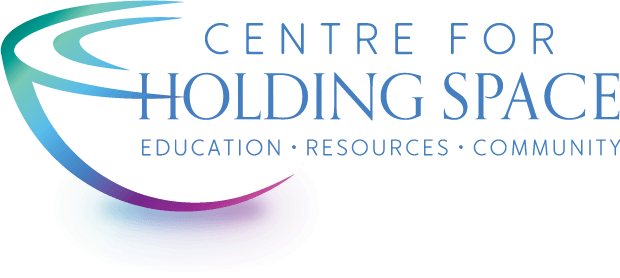In 2019, our own Master Practitioner Candidate, Brenda Barritt, began a process of teaching the principles and tools of Holding Space to the organization she then belonged to. This is her story of how that journey began and her reflections on the process.
by Brenda Barritt
Two years after submitting a formal proposal for funding – we sat in circle to close out the pilot phase of development and the funding project management said “Who would have known the impact this offering would have?” I smiled and said, “I did.” I knew. Although maybe the real answer was “I believed.”
I believed that we needed an opportunity, an intervention, that would allow the people in our system to shift from identifying as ‘fixers’ and ‘helpers’ to being able to serve with their whole-r selves, and in a way that sustains ourselves and can alleviate some of the risk of burnout and compassion fatigue.
In September 2018 I was listening to a keynote presentation at our provincial Literacy and Learning Symposium and watching many members of the audience nod their heads, sit up straighter, and become physically motivated as the presenter spoke to the fact that the greatest asset within the adult learning system is the people learners meet and build relationships with and that building those relationships is essential for learner success. This was a powerful message because this was the role most people in that room wanted to play.
At that time I was manager of a community adult learning centre and was fortunate to have someone on our team that was a skilled cheerleader and coach and had witnessed how her ability to build relationships with each person who came to her for guidance and learning support was key in their learning success. And I knew that she was planning to retire sometime soon. As I looked towards a succession plan, I saw a lack of experience and skill within our existing team and knew that we, as an organization, were not alone.
Having been part of a provincial advisory committee, I could see in our system an uncertainty and need for greater competency to allow our people to comfortably coach and advise our most vulnerable learners. The system had acknowledged the need for people to have sustained engagement with our organizations and our programs in order to have a lasting impact and build literacy and foundational life skills. While we had plenty of professional development and training available for employees and tutors related to teaching literacy and numbers as well as curriculum and resources to use, we did not have consistent and customized content to deepen the competence in our system to hold the meaningful relationships with our learners that make them more comfortable to set realistic yet stretching goals for themselves, that make them feel able to come back to us even when they’ve had a set-back or diversion, that creates sustained engagement to take our learners farther than they may have expected they could.
I had recently completed the Foundation program of the Holding Space program with Heather Plett and was continuing on through the Deeper Quest program (predecessor to the Certification program). Knowing that “holding space” is about creating the container and growing the relationships to be able to walk alongside another person and support their journey, and having seen how giving myself the permission and the container to build the muscles to show up in this way, I wondered how I could bring those competencies more explicitly to the adult learning system and address some of the gaps I saw. Fortunately, at that same conference a request for proposals was opened for new professional development offerings to be developed. I approached Heather Plett with the opportunity and we submitted a proposal to take a small part of the Foundation program materials and adapt them into a customized introductory level program for the adult learning system. Our proposal was accepted and we moved forward. Through 2019 and 2020 we pulled together materials from across the Foundation program and customized it with specific examples and adapted exercises, running 3 pilot programs and training 2 of the provincial staff to be facilitators for a program that covers 11 weeks. A key element of the design is that we are creating communities of learners that span across the province and the organization. We have had volunteer tutors learn alongside executive directors, our provincial support team sitting in circle with program coordinators, and funding managers connecting to staff who work with people currently incarcerated. The change is coming through ripples that extend from individuals in different parts of the system as they bring this approach into their work, they connect their work across positions and places, and invite others to join.
competencies more explicitly to the adult learning system and address some of the gaps I saw. Fortunately, at that same conference a request for proposals was opened for new professional development offerings to be developed. I approached Heather Plett with the opportunity and we submitted a proposal to take a small part of the Foundation program materials and adapt them into a customized introductory level program for the adult learning system. Our proposal was accepted and we moved forward. Through 2019 and 2020 we pulled together materials from across the Foundation program and customized it with specific examples and adapted exercises, running 3 pilot programs and training 2 of the provincial staff to be facilitators for a program that covers 11 weeks. A key element of the design is that we are creating communities of learners that span across the province and the organization. We have had volunteer tutors learn alongside executive directors, our provincial support team sitting in circle with program coordinators, and funding managers connecting to staff who work with people currently incarcerated. The change is coming through ripples that extend from individuals in different parts of the system as they bring this approach into their work, they connect their work across positions and places, and invite others to join.
While the end aim was to impact the experience people had when they came in to learn through these adult centres, the change had to come through impacting the culture of the organization overall. In a recent gathering with participants from all 3 pilot programs they spoke about this program giving them permission to show up more fully and tools to set healthy boundaries and tend to their own well-being. One person spoke about how it has shifted how we relate to each other – which is now shifting how we relate to others.
This is not easy work – the goal may be professional but the process is personal. However in a year that collapsed our work spaces into our home spaces and had us show each other our pets, children, partners, and hobbies through zoom, while at the same time carrying out our other jobs and roles; perhaps what was needed most was the skill and capacity to show up as our whole selves – to support each others whole beings – in ways that sustain us and deepen our common work.
If you would like more information about embedding Holding Space into your workplace, please feel welcome to contact us!

